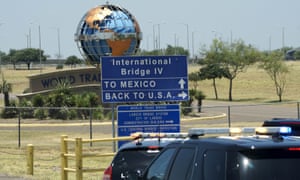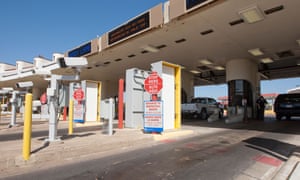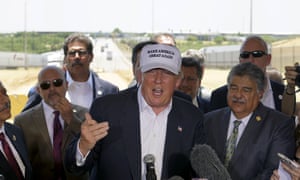Listen To Military Veteran Talk Radio
www.theguardian.com
Cruz may have taken the state on Super Tuesday, but Trump’s wins along border prove he hasn’t been shunned by Latinos despite controversial immigration plan
Donald Trump near the US-Mexico border outside Laredo, Texas, in July. The rationale for his win there has been attributed to personality, not policy. Photograph: Rick Wilking/Reuters
A candidate who has described Mexicans as rapists and criminals and whose core immigration plan is to make Mexico pay for a giant wall ought not to prosper on the southern border. Yet Donald Trump was embraced on Tuesday by voters in America’s most Hispanic city.
Trump won almost 35% of the Republican primary vote in Webb County, where Laredo is the county seat, comfortably ahead of Marco Rubio (28.4%) and Ted Cruz (28.2%), the Hispanic senator from Texas who finished first in the state overall.
Not that it takes a lot of GOP votes to win here – only 4,089 were cast in the race, compared with nearly 26,000 among Democrats. Laredo is 96% Hispanic or Latino, according to the 2010 census, and it is hugely Democratic: Barack Obama won 77% of the vote in the county in 2012. In an unusual spurt of eloquence, twice-failed GOP presidential hopeful and former Texas governor Rick Perry once called the border the blueberry in the tomato soup: a speck of nutrition for Democrats in a Republican-dominated state.
Despite the limited GOP voter pool, it is notable – and jarring – that Trump should not only triumph here but generally perform better in border counties than in the Texas interior, where Cruz was in command. Aftersome small-scale polling at the Nevada caucuses, Tuesday’s outcome provided harder evidence that Trump has not been shunned by conservative Latinos. He may even have inspired them into action: he won more votes in Webb County than were cast in its primary in total in 2012.
One Trump voter in Laredo, who gave her name as Cindy, said he is popular with local elderly people who are “tired of the system”. Jon Melendez, president of the Webb County YoungRepublicans, speculated that Trump’s success owed something to Democrats voting for him because he would be easier for Hillary Clinton to beat in November. “In the fall, the Democrats will be absolutely energised to vote against him,” Melendez said.
Trump bested two Hispanic senators who have also talked tough on immigration, in Rubio and Cruz – though both have Cuban heritage, rather than Mexican or Central American, and there is resentment at a US policy that fast-tracks admission and residency for growing numbers of Cubans while migrants from other countries have far bigger hurdles to overcome.
That situation is one example of the complexities and contradictions here that elude the bombastic rhetoric and uncompromising immigration positions of the main Republican presidential candidates.
 Donald Trump’s motorcade arrives near the US-Mexico border, outside Laredo, Texas, in July. Photograph: Rick Wilking/Reuters
Donald Trump’s motorcade arrives near the US-Mexico border, outside Laredo, Texas, in July. Photograph: Rick Wilking/Reuters
Laredo is a characterful place of bridges and barriers; of ramshackle little homes, pastel-coloured hole-in-the-wall taquerias and family-run auto repair centres, with a decayed downtown of thrift stores, sagging shoe shops, bright currency exchanges and buildings whose grandeur faded long ago.
Laredo’s small-town familiarity and stability is interspersed with with busy crossings, a railway bridge and an interstate highway that barges through the centre of the city to speed trucks northwards where the sprawl subsides into ranchland and flat emptiness and the roving white and green SUVs of the border patrol.
It is the largest inland port on the US-Mexico border, mentioned soon after Los Angeles and New York in scale of international trade. Its population is about 250,000, though the county is vast: two-thirds the size of the LA metropolitan area. It snuggles up to Nuevo Laredo, the more populous and notoriously violent Mexican city on the other side of the serpentine Rio Grande. Laredo’s biggest festival is a near month-long celebration of George Washington’s birthday with a jalapeño-eating contest as its highlight.
Laredo carries on its broad shoulders an irony shared with frontier towns across the world: that the governmental apparatus of scrutiny, suspicion and separation is at its most prominent, its most stubbornly wedged, between communities that have the most in common.
“We talk about security but we like to have a balance between security, legitimate trade and tourism so when somebody comes in and says ‘I want to build a wall and secure the border’ that goes contrary to our daily life that we have in Laredo,” said Henry Cuellar, a Democrat who is the district’s US congressman.
Erick Barroso is a 42-year-old corrections officer who votes for some Democratic candidates in local elections, depending on who’s running. Often, Democrats are the only names on the ballot. But he is leaning towards Trump in November’s general election.
“I don’t agree with the wall,” he said. “There’s a saying, if you build 20ft walls you’re going to sell 21ft ladders … They’re always going to find ways [to cross], a wall isn’t the perfect solution.” But he’s not seeing anyone else suggest a better idea right now.
While immigration measures naturally have the most profound and immediate impact on border-dwellers, Barroso’s reasoning for backing Trump could have come from one of his supporters in Pittsburgh, or Louisville, or Minneapolis. The rationale stems from personality, not policy.
“He’s strong and he’s very confident,” Barroso said. “I don’t support everything he says but a lot of the things, he’s not afraid to say it. I see that as a strong characteristic.”
Laredo experienced Trump’s self-belief and self-promotion up close last July when he paid a brief visit, a month after kicking off his campaign by claiming that Mexico is “sending people that have lots of problems, and they’re bringing those problems with us. They’re bringing drugs. They’re bringing crime. They’re rapists. And some, I assume, are good people.”
 Bilingual signs in English and Spanish with information at the Laredo, Texas, port of entry from Mexico. Photograph: Alamy
Bilingual signs in English and Spanish with information at the Laredo, Texas, port of entry from Mexico. Photograph: Alamy
After an outcry, the local border patrol union rescinded its invitation to the candidate, though Trump came anyway – and was shown around by the city’s mayor, a Democrat. He portrayed himself as bravely trekking into dangerous territory, but crime figures suggest Texas’s border cities are some of the safest in the state.
Reports indicate there were more media and police than protesters. One of the demonstrators was Henry Rodriguez, of the League of United Latin American Citizens, who came down from San Antonio to heckle the tycoon. “We went and made a big old ruckus over there,” he recalled.
“The more he talks against immigrants, it seems like the more brownie points he gets. It’s sad because it’s kind of a mentality that still exists in this country, of haters.”
The 71-year-old is frustrated by the lack of empathy and nuance in the political discourse on immigration. “There are a good number of Republican Latinos, their parents came from Mexico or Central America or other places like South America, they really don’t care much about people that are coming over now. They’re saying they’re taking away resources from them,” he said.
“But the ones that come here want to better themselves and they’ll do anything, they’ll start off take lower wages than anyone, taking jobs nobody else will do.”
Melendez, a 30-year-old student and former marine, said that “a lot of us here see it day to day, there is an illegal influx of people coming from Mexico and that needs to be addressed. However, the tone and the rhetoric and everything else coming out of Donald Trump’s mouth has been counterproductive.”
“I can get behind somebody who wants to secure the border,” he added. “But I think that Trump has just been awful.” Before Tuesday night, that view would have seemed like conventional wisdom. But even in Laredo, demagoguery confounded demographics.
COMMENTS

No comments:
Post a Comment